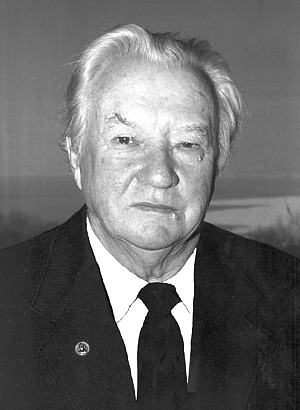|
Pavel Andreyevich Lehr: 1923-2005
Arkady Lelej, Head of the Entomology Laboratory, Institute of Biology and Soil Science, Vladivostok, Russia.
lelej@ibss.dvo.ru
Lehr's Ph.D. dissertation, "Asilid flies of South-East Kazakhstan", was defended in 1959; an additional doctoral dissertation, "Asilid flies of Kazakhstan and Middle Asia" was completed and defended in 1970. In 1987 he was elected a corresponding member of the Academy of Sciences.
In 1973 Lehr founded the Laboratory of Systematics and Zoogeography of Terrestrial Arthropods (later called the Laboratory of Entomology) in the Institute of Biology and Soil Science, Vladivostok. It was his idea to create the fundamental publication, "Key to the Insects of the Russian Far East", which deals with all the insects of the Russian Far East and adjacent territories. This long-term project (19 parts in 6 volumes) began in 1986; 16 parts treating more than 23,000 insect species, have already been published.
Pavel Andreyevich was a world authority on robber flies (Diptera: Asilidae). He investigated vast territories of the Russian Far East, Siberia, Kazakhstan and Middle Asia. He described one subfamily, four tribes, 34 genera and 292 species and subspecies, mainly from the Palaearctic region. His asilid collection, housed in the Institute of Biology and Soil Science, Vladivostok, numbers 40,000 specimens of 700 species, including the holotypes of 117 species and paratypes of 57 species. His sections on the Asilidae in the Catalogue of Palaearctic Diptera (1988) and the monograph "Robber flies of the subfamily Asilinae (Diptera, Asilidae) of the Palaearctic Region" (1996) are among the most important of his 89 scientific contributions. Pavel Andreyevich supported many young researchers - nine Ph.D. dissertations have been defended under his guidance and some of his students now hold prominent positions in Russian entomology. His colleagues have named two genera and 21 species after him; this number will surely increase in the years to come.
In 1993, I (RAC) was one of Pavel Andreyevich's first foreign visitors after the dissolution of the Soviet Union. Vladivostok had been a closed city and impossible to visit earlier. I was in the early years of my study of Lasiopogon, and virtually all the material of this genus from eastern Asia was in Lehr's collection. After weeks in the lab and field, I flew home with almost 1000 borrowed specimens and others that I had captured during my trip. These collections were critical to my work, as were the piles of Russian asilid papers that Pavel Andreyevich gave me during my stay (Not only was he an accomplished systematist, but he wrote insightful papers on robber fly ecology). He was a gracious host and I will always cherish his generosity and friendship.
Perseverance, tenacity and dedication helped Pavel Andreyevich overcome the tribulations of his life. Integrity and honesty guided his actions and his work. His humanity and unquenchable interest in the insect world endeared him to his friends and colleagues. They will not forget him.
Pavel Andreyevich Lehr is buried in Sergiev Posad, near Moscow.
Dr. Robert A. Cannings, R.P.Bio.
|
 Pavel Andreyevich Lehr, the prominent student of Palaearctic Asilidae, died on 15 September 2005 at the age of 82 years. Born on 27 September 1923 in Saratov, Russia, in 1941 he and his family were deported to a small village in South Kazakhstan after the liquidation of the German autonomous region in Povolzhye. From April 1942 to September 1943 he was held in a so-called labour army (really as a prisoner) in the South Urals but was "demobilized" because of starvation. But he survived. In 1953 Pavel Andreyevich graduated, cum laude, from Kazakh State University in Alma-Ata and subsequently taught high school with his wife Nina in North Kazakhstan. From 1956 to 1965 he headed the Laboratory of Biological Control in the Institute of Plant Protection in Alma-Ata and from 1965 to 1973 he was a teacher and later professor of Kazakh State University. In 1973 Pavel Andreyevich was made head of the Laboratory of Systematics and Zoogeography of Terrestrial Arthropods in the Institute of Biology and Soil Science, Vladivostok. From 1977 to 1979 he was Deputy Director of this Institute and from 1981 to1991 he was Director. From 1991 until his death he was a consultant to the Russian Academy of Sciences.
Pavel Andreyevich Lehr, the prominent student of Palaearctic Asilidae, died on 15 September 2005 at the age of 82 years. Born on 27 September 1923 in Saratov, Russia, in 1941 he and his family were deported to a small village in South Kazakhstan after the liquidation of the German autonomous region in Povolzhye. From April 1942 to September 1943 he was held in a so-called labour army (really as a prisoner) in the South Urals but was "demobilized" because of starvation. But he survived. In 1953 Pavel Andreyevich graduated, cum laude, from Kazakh State University in Alma-Ata and subsequently taught high school with his wife Nina in North Kazakhstan. From 1956 to 1965 he headed the Laboratory of Biological Control in the Institute of Plant Protection in Alma-Ata and from 1965 to 1973 he was a teacher and later professor of Kazakh State University. In 1973 Pavel Andreyevich was made head of the Laboratory of Systematics and Zoogeography of Terrestrial Arthropods in the Institute of Biology and Soil Science, Vladivostok. From 1977 to 1979 he was Deputy Director of this Institute and from 1981 to1991 he was Director. From 1991 until his death he was a consultant to the Russian Academy of Sciences.